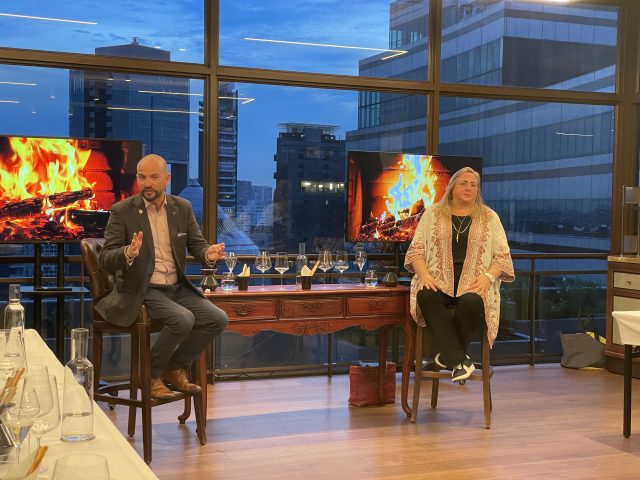This website uses cookies so that we can provide you with the best user experience possible. Cookie information is stored in your browser and performs functions such as recognising you when you return to our website and helping our team to understand which sections of the website you find most interesting and useful.
‘Wine counterfeits will continue to be a problem,’ says Maureen Downey
Speaking at 67 Pall Mall Singapore, wine fraud expert Maureen Downey shared the latest insights into wine counterfeits, NFTs and Rudy Kurniawan’s wine dinners.

Wine fraud expert Maureen Downey was in Singapore to conduct a masterclass on fraudulent and counterfeit wines. She compared authentic bottles with fake doppelgangers to educate her audience, with tools of the trade like a magnifying loupe and blue light.
Downey, who is the founder of Chai Consulting and winefraud.com, is an expert in wine authentication and consults for the FBI in wine fraud cases.
In a fireside conversation with Richard Hemming MW at 67 Pall Mall Singapore, she shared insights into the world of wine fraud in her classic straight-shooting style.
Wine fraud is pervasive and has proliferated the industry, Downey said. Counterfeiters now are mass-producing more recent release wines and cheaper wines like the counterfeit Yellow Tail that flooded the Birmingham market in 2021.
She highlighted that organised crime groups are getting involved in fake wines. They are tech-savvy and know their way around a half-million-dollar digital printer, glass, and capsules to get going. “It is a relatively low bar to entry in terms of capital investment, and it’s nothing but reward.” Besides, counterfeiting wine seem like a low-risk crime, she said, when the list of convicted wine criminals is limited to a handful of names like Rudi Kurniawan and Alexandr Lugov.
On production zones, Downey named regions from across the world, including Bulgaria, Northern Italy, Switzerland, California, China and, of late, Syria.
“Conflict zones are massive for the production of counterfeit wines and spirits. Syria has been one of the largest producers of counterfeit spirits. In the last several years, Northern Ireland —massive producers of counterfeit whiskey,” she said, highlighting Sassicaia and Chateau Rayas as some of the fine wines on the fraudster’s production line.
Reflecting on some reasons wine fraud is still prevalent, Downey believes the issues lie with the supply chain. “Wine and spirits have some of the most opaque supply chains in the world,” she said. “Governments, in some cases, have better vision over the supply chain of illicit drugs than they do over wines and spirits. So, until we can talk about supply chain oversight, counterfeits are going to continue to be a problem.”
She was speaking about the secondary market, where fine wine bottles are often sold on Facebook or private emails, without any proof of provenance. By Downey’s estimate, “on the secondary market, we’re probably looking at between 5% and 10%t of it being counterfeit”. Her advice to her audience was buy wines from known sources and to press the buyers for information.
Blockchain technology is hailed as a solution but as for NFT chips, Downey was quick to dismiss them as a “feel-good mechanism”. She said: “They (NFTs) don’t really do anything to protect the producer, nor do they do anything to empower the producer.”
Lastly, the conversation couldn’t be complete without taking account of Rudy Kurniawan, who is said to be back to his old wine dinner regime, this time in Singapore.
Downey said: “From what I understand, he’s back in business and spending a lot of time here in Singapore. And I think that has a lot to do with the fact that Singapore is once again, regaining its ground as a fine wine hub of Asia.”

